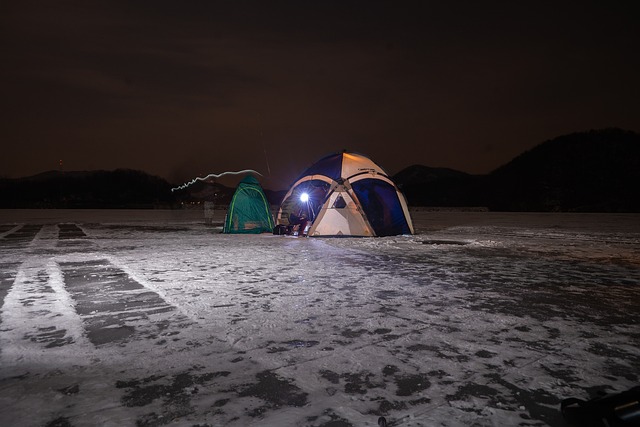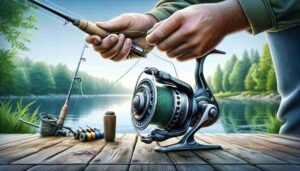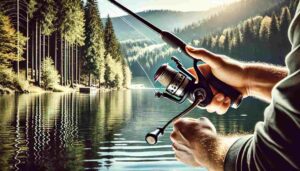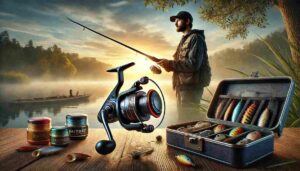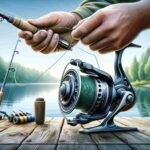I’ve been there, contemplating the idea of turning my ice fishing excursion into an overnight experience. Ice fishing is not just a sport; it’s an adventure that beckons many outdoor enthusiasts during the winter months. But as the sun dips below the horizon, a question often arises: Can you sleep in an ice fishing tent?
Yes, you can sleep in an ice fishing tent. Ice fishing tents are designed to provide shelter and warmth in cold winter conditions, making them suitable for overnight stays on frozen lakes. These tents typically have insulation, ventilation options, and compatibility with portable heaters, allowing anglers to stay warm and comfortable throughout the night. It’s essential to follow safety guidelines, monitor ice conditions, and use appropriate gear to ensure a safe and enjoyable experience while sleeping in an ice fishing tent.
The thought of spending a night on a frozen lake can be both thrilling and daunting. In this friendly and informative article, I’ll take you on a journey to explore the ins and outs of sleeping in an ice fishing tent. I’ll dive into the different types of tents, discuss how to stay warm and safe, and even share tips for a comfortable night’s sleep. Let’s get started!
The Essentials of Ice Fishing Tents
When it comes to spending a night in an ice fishing tent, the first step is to choose the right shelter. Ice fishing tents come in various shapes and sizes, each designed to cater to different preferences and needs. Let’s dive into the essentials of ice fishing tents to help you make an informed choice:
Types of Ice Fishing Tents
- Flip-Over Tents: These are compact, one-person tents that can be easily set up and moved around. They’re great for solo adventurers or those who prefer mobility.
- Hub-Style Tents: Hub-style tents are larger and can accommodate multiple people. They’re spacious and offer more headroom, making them ideal for group outings or when you want extra room to move around.
- Cabin-Style Tents: If you’re planning an extended stay on the ice or prefer a more homey atmosphere, cabin-style tents are a great choice. They resemble small cabins, providing ample space for both fishing gear and sleeping quarters.
Materials and Durability
- Weather-resistant Fabrics: Look for tents made from materials like polyester or nylon with a waterproof coating. These materials keep you dry and protected from the elements.
- Sturdy Frame Construction: A durable tent frame is essential, especially in windy conditions. Reinforced frames made of materials like steel or fiberglass provide stability and prevent the tent from collapsing.
Size and Capacity
- Solo vs. Group Fishing Trips: Consider how many people will be joining you on your ice fishing adventure. Choose a tent size that comfortably accommodates your group without feeling cramped.
- Accommodating Gear and Sleeping Arrangements: Make sure the tent has enough room for your fishing gear, including heaters, chairs, and fishing holes. Additionally, plan your sleeping arrangements, whether it’s a sleeping bag, cot, or inflatable mattress, and ensure the tent can accommodate these comfortably.
Now that I’ve covered the basics of ice fishing tent types, materials, and sizes, you’re well on your way to choosing the perfect shelter for your overnight adventure.
In the next section, I’ll explore how to prepare your ice fishing tent to ensure a warm and cozy night’s sleep.
Preparing Your Ice Fishing Tent for a Night’s Rest
Now that you’ve chosen the right ice fishing tent for your adventure, it’s time to prepare it for a comfortable night’s sleep. Ensuring your tent is well-insulated and equipped with the right heating options is essential for a cozy overnight stay.
Insulation and Heating Options
- Insulated Walls and Floors: Look for tents with insulated walls and floors. These features help retain heat and keep the cold out, making a significant difference in maintaining a comfortable temperature inside the tent.
- Portable Heaters: Investing in a portable heater is a game-changer for overnight ice fishing. Choose a safe, propane or electric heater that’s appropriate for the size of your tent. Place it strategically to evenly distribute warmth throughout the space.
Proper Ventilation
- Vent Placement: While insulation is crucial, so is ventilation. Properly positioned vents allow moisture and carbon monoxide to escape, ensuring a safe and breathable atmosphere inside the tent.
- Avoiding Condensation Buildup: Condensation can be a concern in a closed, heated tent. To combat this, crack a window or vent slightly to allow moisture to escape. Be cautious not to overdo it, as you don’t want to let in too much cold air.
Setting Up a Comfortable Sleeping Area
- Sleeping Bags and Pads: Choose a high-quality cold-weather sleeping bag rated for the temperatures you expect. Additionally, insulating sleeping pads or air mattresses provide a barrier between you and the cold floor, enhancing warmth and comfort.
- Pillows and Blankets: Don’t forget to bring pillows and extra blankets to make your sleeping quarters as cozy as possible. Layering blankets can help you adjust your warmth level throughout the night.
Let’s explore tips on how to stay warm throughout the night and ensure a safe and enjoyable experience.
Staying Warm Throughout the Night
When it comes to sleeping in an ice fishing tent, staying warm is a top priority. The frigid temperatures outside can quickly turn your cozy tent into a chilly retreat. Here’s how to keep the cold at bay and enjoy a comfortable night’s sleep:
Layering Clothing
- Thermal Base Layers: Start with a good-quality thermal base layer. These moisture-wicking garments trap warmth close to your body and keep you dry.
- Cold-Weather Clothing Tips: Wear insulated pants and jackets designed for cold climates. Mittens or gloves, thermal socks, and a warm hat are essential for keeping extremities warm.
Keeping the Tent Warm
- Safe Heater Operation: If you’re using a portable heater, follow all safety instructions diligently. Keep the heater away from flammable materials, ensure proper ventilation, and use carbon monoxide detectors to monitor air quality.
- Using Insulated Tents Effectively: Take advantage of your tent’s insulation by sealing any gaps or openings. Use draft stoppers or heavy blankets to block drafts around the tent’s edges.
Hot Drinks and Snacks
- Warm Beverages: Sipping on hot tea, coffee, or cocoa can help raise your core body temperature. A thermos filled with your favorite hot beverage is a welcome addition to your overnight gear.
- High-Energy Foods: Consuming high-energy, hot meals or snacks before bedtime can provide your body with extra fuel to generate heat. Consider bringing portable, heatable meals or snacks like oatmeal, soup, or energy bars.
By layering your clothing, properly using a heater, and enjoying warm beverages and snacks, you’ll stay toasty and comfortable throughout the night. However, staying warm is just one aspect of a successful ice-fishing tent sleepover.
Safety Measures
Safety should always be a top priority when sleeping in an ice fishing tent. The frozen environment can present unique challenges, so it’s essential to take precautions to ensure a secure and enjoyable experience:
Monitoring Ice Conditions
- Ice Thickness Guidelines: Before setting up your ice fishing tent, check local ice thickness guidelines. Generally, at least 4 inches of clear ice is considered safe for a single person, but thicker ice is needed for groups or vehicles.
- Testing Ice with an Auger: Use an ice auger to drill test holes at regular intervals to confirm ice thickness. Be cautious if you encounter varying ice conditions, such as cracks or thin spots.
Carbon Monoxide Awareness
- Ventilation for Heater Safety: Properly ventilate your tent when using a heater. Ensure that vents or windows are open to allow fresh air to circulate and prevent the buildup of carbon monoxide.
- Carbon Monoxide Detectors: Invest in a battery-powered carbon monoxide detector for your tent. It’s a crucial safety device that can alert you to dangerous levels of carbon monoxide.
Emergency Preparedness
- First-Aid Kits: Pack a well-stocked first-aid kit that includes essentials like bandages, antiseptic wipes, and any personal medications you may need. Be prepared for minor injuries or medical issues that may arise.
- Communication Devices: Carry a reliable means of communication, such as a fully charged cell phone or two-way radio. Ensure you have a backup power source for your phone, like a portable charger.
- Emergency Plan: Share your ice fishing plans and location with someone you trust. Let them know when you expect to return, and establish a plan for them to contact authorities if you don’t check in on time.
Taking these safety measures seriously will help ensure that your ice fishing tent adventure is not only enjoyable but also secure
The Sleeping Experience
A peaceful and restful night’s sleep is essential for enjoying your ice fishing tent adventure. Here are some tips to enhance your sleeping experience in the chilly, serene environment:
Managing Noise and Light
- Quiet Gear Organization: Organize your fishing gear and equipment before bedtime to minimize noise during the night. Avoid rummaging around in the dark, which can disturb both you and your fellow anglers.
- Darkening the Tent: If you’re sensitive to light, bring blackout curtains or light-blocking materials to cover your tent’s windows. This can help you sleep better, especially if you’re camping in an area with extended daylight hours.
Sleeping Tips
- Relaxation Techniques: Falling asleep in a new environment can be challenging. Practice relaxation techniques like deep breathing or meditation to ease any anxiety or restlessness.
- Staying Comfortable: Adjust your clothing layers and bedding to maintain a comfortable temperature throughout the night. It’s a good idea to keep a small flashlight or headlamp within reach for any midnight trips outside the tent.
Sharing the Experience
- Group Dynamics: If you’re sharing your tent with friends or family, be considerate of one another’s space and sleep needs. Establish ground rules for noise levels and sleeping arrangements.
- Creating Lasting Memories: An overnight ice fishing trip is an opportunity to create unforgettable memories. Take the time to share stories, play games, or simply enjoy the beauty of the winter landscape with your companions.
With these sleeping tips in mind, you’ll be better equipped to enjoy a peaceful and comfortable night in your ice fishing tent.
Conclusion
So, can you sleep in an ice fishing tent? The answer is a clear yes! With the right gear, preparation, and a dash of adventurous spirit, spending a night in an ice fishing tent can be an unforgettable experience.
Preparing your ice fishing tent for a night’s rest involves insulating your shelter, using heating options effectively, and creating a comfortable sleeping area. These steps ensure that when the temperature drops, you can stay cozy and warm inside your tent.
Staying warm throughout the night is paramount, and I shared tips for layering clothing, using heaters safely, and enjoying hot drinks and snacks to maintain comfort in the cold. Proper preparation can make all the difference in the world.
In the end, it’s not just about surviving the night; it’s about thriving in a winter wonderland. The tranquility of the frozen landscape, the thrill of catching fish beneath the ice, and the cozy comfort of your tent all come together to create a unique adventure.
As you venture into the world of overnight ice fishing, remember that the cold can be harsh, but the memories you’ll create are worth every shiver. So, pack your gear, gather your friends or family, and embark on a journey into the heart of winter. Yes, you can sleep in an ice fishing tent, and it’s an experience you won’t want to miss. Sweet dreams, ice angler!
Here’s another article you may also like: Do Worms Really Work For Ice Fishing?


